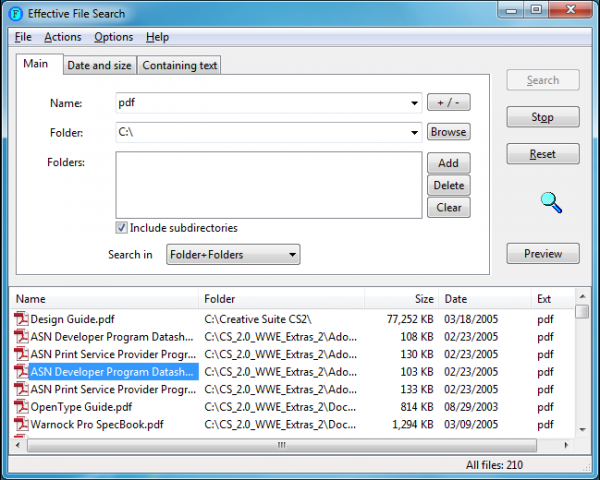Find anything on Windows with Effective File Search

At first glance, Effective File Search seems much like any other Windows search tool. Enter the file spec here; choose the folder you’d like to search over there; optionally filter by date or file size, or maybe enter some text which the file must contain. It all seems very familiar.
Take a closer look, though, and you’ll find this free program offers a real depth which goes far beyond what you’ll see with most of the competition.
Run a text search, for instance, and of course you can have the program just check for the full line of text you entered (a phrase search). But you can also tell it to search for the individual words. The program can look for hex code (1A D2 FF), check for Unicode strings, run a case sensitive search, and there’s even support for regular expressions.
The date filter is similarly versatile. So you can look for files based on their creation, modification or last access dates, and these can be specified either as a date range, or a defined time from now (anything from the last few seconds to years, depending on your needs).
Even the most basic fields can be extended. So you don’t just have to enter a single parameter in the Name box, for instance. You can build up a much more complex logical expression, perhaps looking for file names containing the word "Accounts" or "Business", which also include "2012", but not the word "December".
 And although Effective File Search doesn’t have an indexing component, which inevitably cuts performance, it does have some other tricks which can help. In particular, you don’t just have to point the program at a single directory tree; instead, you can create a list of commonly-used folders which it should search, and used wisely that can make a real difference to overall speeds.
And although Effective File Search doesn’t have an indexing component, which inevitably cuts performance, it does have some other tricks which can help. In particular, you don’t just have to point the program at a single directory tree; instead, you can create a list of commonly-used folders which it should search, and used wisely that can make a real difference to overall speeds.
If you’re thinking that all of this can make for quite a complex search query, then you’re right. You don’t have to use a particular filter unless you need it, though. And Effective File Search can save and recall your chosen parameters on demand, so if you do need to run a complex search regularly then you only need create it once.
And perhaps most surprising, the program even includes a scripting component to help with particular file management tasks. You could use this to locate particular documents which you’ve created or updated in the last week, perhaps, then copy them to another drive as a simple form of backup.
If we’ve an issue here it’s probably with the documentation. There are a lot of features to explore and explain, and the Help file you get is a little on the thin side; we may well have missed a few of the more complex points.
The core of Effective File Search is simple enough to use, though, and if you’re looking for a search tool with a little more filtering power then it could be a great choice.
Photo credit: olly/Shutterstock
